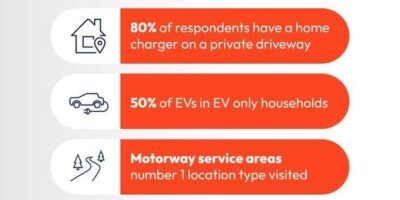A collection of seven British businesses are aiming to boost electric vehicle (EV) uptake through the formation of the Electric Vehicle Fleet Accelerator (EVFA).
Spawned from the Prime Minister’s Build Back Better Business Council the EVFA – made up of BP, BT, Direct Line Group, Royal Mail, scottishpower, Severn Trent and Tesco – has identified four key areas to deliver the UK’s EV ambitions.
These are: future-proofing the electricity network infrastructure, enabling the UK-wide rollout of charging infrastructure, overcoming demand obstacles and expanding the supply of UK-made vehicles.
Releasing recommendations to both the government and industry spanning these areas, the EVFA said if implemented, they could unlock private sector investment of £50 billion in infrastructure and fleets over the next five years.
Over the next twelve months specifically, the Department for Transport (dft) should set out a clear funding framework to leverage private investment in charging infrastructure, ensuring public funding targets areas that are less attractive to private investment.
In the same time frame, Ofgem should consult on its policy for distribution network operators (dnos) to be providers of last resort for EV charging infrastructure.
Under new regulations, dnos are prohibited from owning, developing, managing or operating public EV chargepoints, however they are able to act as a provider of last resort where it can be shown the market won’t deliver. In these situations, they can own the infrastructure for five years before carrying out another market engagement exercise.
However, the EVFA said the policy or guidance that sets out how this will work in practice hasn’t been provided. As such, Ofgem should develop the necessary regulatory mechanism to ensure dnos are appropriately funded for taking on the role of provider and owner of public EV charging infrastructure.
“The electrification of all evs across the UK will mean a doubling of demand through our grid network and it won’t be ready without urgent action and investment in the grid system – and this investment must happen now and must come ahead of increasing demand,” Keith Anderson, CEO of scottishpower, said.
The dnos released their RIIO-ED2 business plans last month, with preparing their networks for evs a key focus of many plans.
However, there have been previous incidents of funding requests from dnos having been rejected by the regulator, such as SP Energy Network’s bid to spend £42 million on increasing network capacity in anticipation of the uptake of evs in 2019.
Over the next two years, the EVFA recommends Local Authorities are required to support the growth of charging hubs alongside on-street charging infrastructure.
This follows a similar recommendation from the Competition and Markets Authority that the government supports Local Authorities in boosting the rollout of on-street charging, including by defining a clear role for Local Authorities to manage the rollout in their area and providing funding for the expertise needed for this to happen.
The Ministry of Housing, Communities and Local Government and Local Authorities should also work with key stakeholders such as dnos and chargepoint operators to fast track EV charging infrastructure to support the rapid development of ultrafast charging site.
Also over the next two-three years, standards should be set for interoperability of charging platforms, ensuring a seamless experience for consumers when they want to locate, use and pay for charging at public points.
Between 2024 and 2030, the Treasury should address the disparity between the 5% VAT incurred on electricity at home compared with the 20% VAT incurred at public chargepoints.
Last month, the Transport Committee also suggested the government could address this discrepancy, with this following HMRC confirming in May that the VAT on public EV charging stands at 20%, having received requests for clarity from businesses around reduced rates due to the level of electricity being supplied.
The members of the EVFA have committed to converting the fleets involved to evs by 2030 and to buying 70,000 British-built vans by 2030 or sooner if the government delivers on the outlined agenda.
*Article Source www.current-news.co.uk








